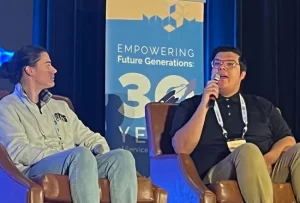STEM careers discussed at First Nations conference in Niagara Falls

By Sam Laskaris
NIAGARA FALLS – Skylar Manitowabi already has an impressive resume.
The Wiikwemkoong Unceded Territory citizen is a professor at Ottawa’s Algonquin College, teaching courses in construction excellence.
Having already obtained a civil engineering degree from Hamilton’s McMaster University, he is now a candidate for a Master’s of Engineering degree from Carleton University in Ottawa.
He’s considered an Indigenous role model in Science, Technology, Engineering, and Mathematics (STEM). Manitowabi was a speaker at a keynote youth panel, Bridges to the future – Igniting careers for Indigenous youth through STEM mentorship, at the Ontario First Nations Technical Services Corporation (OFNTSC) conference, which concluded on May 13 in Niagara Falls.
Nipissing First Nation member Jared Commanda, a mechatronics engineering student at Queen’s University in Kingston, was also on the panel.
Manitowabi, who has also worked as a technical officer with the National Research Council Canada since September of 2020, was asked what qualities make a good mentor in STEM fields when working with Indigenous youth.
“If I’m looking for a mentor, I guess there’s several check-boxes I’m looking for,” he said. “First of all, are they just a mentor or do they have technical skills as well, and is this person in the same field as I am?”
Manitowabi said he also looks for a mentor who encompasses the Seven Grandfather Teachings and shows empathy with the mentee.
During the panel, Commanda talked about what he felt was the most important aspect of bridging the gap between Indigenous youth and careers in STEM.
“I think it’s important to have a community that is actually understanding of the traditions and values that we use,” he said. “I’d say it’s important to continue educating and have people know about the environmental impacts and just everything, and we value.
“And to really bridge the gap, I would say we need to continue having spaces where we can educate our Indigenous youth, not only at the STEM level but also culturally.”
Manitowabi and Commanda also talked about their visions for the future of First Nations when it comes to technical self-reliance.
“My vision is that our First Nations’ needs are empowered to take care of their own people,” Manitowabi said, adding they need to evolve with technology.
Commanda said his hope is that Indigenous communities can stop reaching out to Indigenous Services Canada for services.
“It’s not really helpful in the first place,” he said. “But I just want to see these communities be self-reliant. Whenever I look into the future, I see Indigenous youth making that happen. And I see our Indigenous youth solving problems for the seven generations ahead. And I think that’s really important.”
The panel also included Bohdana Innes, a member of Moose Cree First Nation, who is an architectural intern at J.L. Richards & Associates.
Melanie Debassige, the executive director of the OFNTSC, moderated the panel.
This marked the 30th year of the OFNTSC conference. The event, which was held at the Sheraton Fallsview, was titled TechNations 2025 and subtitled Empowering Future Generations: 30 Years of Service and Innovation.
Established in 1995, the OFNTSC’s mission includes providing technical advisory services to First Nations throughout the province.


